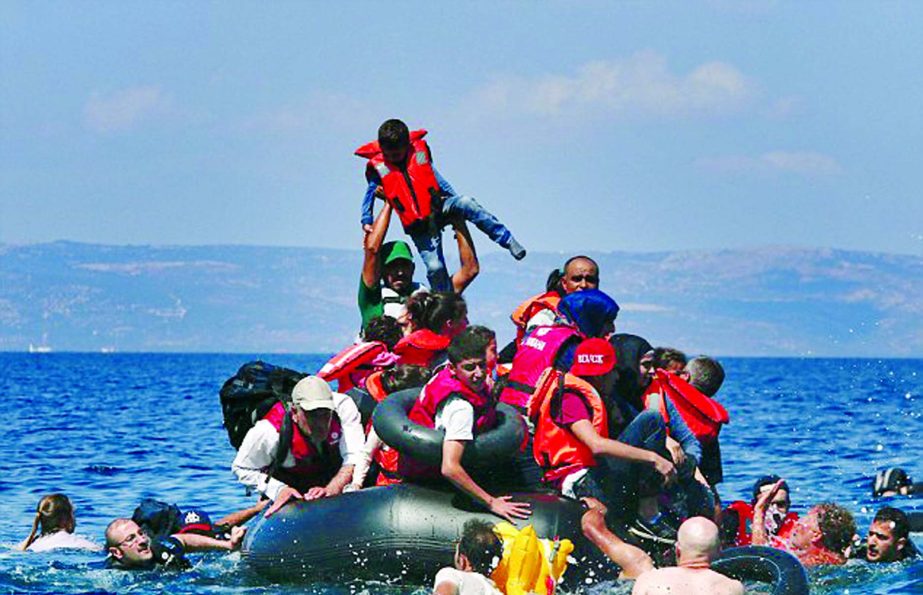
Al Jazeera News :
One million people may arrive in Germany seeking refugee status this year, up from the record 800,000 arrivals its government had earlier predicted, vice chancellor Sigmar Gabriel said.
“There are many signs that Germany this year will take in not 800,000 refugees, as forecast by the interior ministry, but one million,” he wrote to members of his centre-left Social Democratic party on Monday.
Germany on Sunday reintroduced identity checks on people travelling within the passport-free Schengen zone, essentially reversing its open-door policy for Syrians.
Slovakia’s interior ministry said on Monday that it had also renewed checks on its borders with Hungary and Austria. It said that more than 200 extra officers had been deployed at border crossings.
Gabriel stressed that “everyone who applies for asylum on German soil is allowed to stay here until a decision is reached. We are not changing that”.
“The aim is, however, to maintain control of the borders in an unforeseeable and exceptional situation and to return to an orderly handling of refugee policy.
“This includes a clear signal to our European partners that Germany, even if we’re ready to make a disproportionate effort, can’t go it alone and accept all the refugees.”
He added: “Germany is strong and can do a lot. Still, in the last few days we have seen that, despite our best intentions, our capacity to take in people is reaching its limits – especially in view of the speed of the refugee flow.”
As people continued to cross the Mediterranean in numbers, more than 5,800 people entered Hungary in one day, by far the highest number this year, Hungarian police said on Monday.
Police said they detained 5,809 migrants on Sunday, shattering the previous one-day mark of 4,330 set on Saturday.
By 8am on Monday, police said another 3,280 people had been held after crossing the border illegally, taking Hungary’s 2015 total to nearly 195,000.
Many of the refugees flooding into Europe could be left in “legal limbo” as countries adopt different measures to address the situation facing the continent, the UN refugee agency warned.
One million people may arrive in Germany seeking refugee status this year, up from the record 800,000 arrivals its government had earlier predicted, vice chancellor Sigmar Gabriel said.
“There are many signs that Germany this year will take in not 800,000 refugees, as forecast by the interior ministry, but one million,” he wrote to members of his centre-left Social Democratic party on Monday.
Germany on Sunday reintroduced identity checks on people travelling within the passport-free Schengen zone, essentially reversing its open-door policy for Syrians.
Slovakia’s interior ministry said on Monday that it had also renewed checks on its borders with Hungary and Austria. It said that more than 200 extra officers had been deployed at border crossings.
Gabriel stressed that “everyone who applies for asylum on German soil is allowed to stay here until a decision is reached. We are not changing that”.
“The aim is, however, to maintain control of the borders in an unforeseeable and exceptional situation and to return to an orderly handling of refugee policy.
“This includes a clear signal to our European partners that Germany, even if we’re ready to make a disproportionate effort, can’t go it alone and accept all the refugees.”
He added: “Germany is strong and can do a lot. Still, in the last few days we have seen that, despite our best intentions, our capacity to take in people is reaching its limits – especially in view of the speed of the refugee flow.”
As people continued to cross the Mediterranean in numbers, more than 5,800 people entered Hungary in one day, by far the highest number this year, Hungarian police said on Monday.
Police said they detained 5,809 migrants on Sunday, shattering the previous one-day mark of 4,330 set on Saturday.
By 8am on Monday, police said another 3,280 people had been held after crossing the border illegally, taking Hungary’s 2015 total to nearly 195,000.
Many of the refugees flooding into Europe could be left in “legal limbo” as countries adopt different measures to address the situation facing the continent, the UN refugee agency warned.

